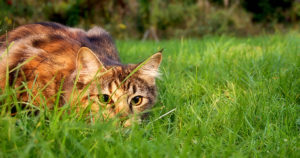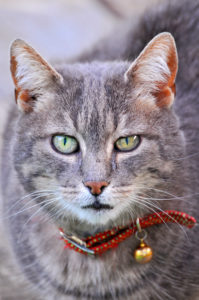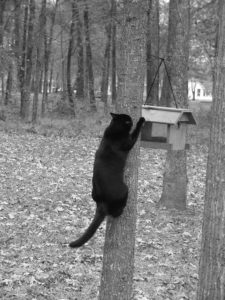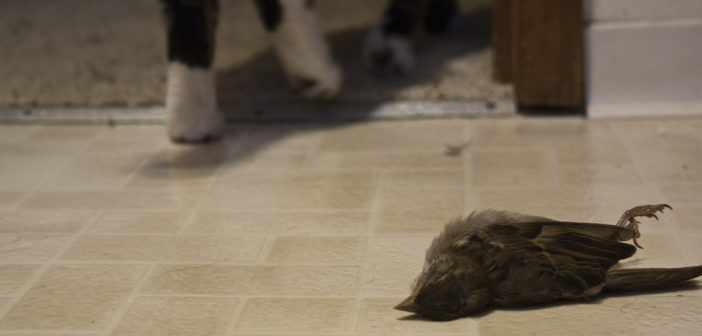Estimates of how many wild birds are killed by cats vary significantly. It has been estimated that in the United Kingdom (UK), cats catch up to 275 million prey items a year, of which 55 million are birds. These are the numbers of prey items known to have been caught. It will never be known how many more were caught by cats but were not brought home or how many escaped but subsequently died.
Regardless of the exact numbers, there is no doubt that pet cats kill many wild birds. The point of this article is to put forward ideas on how to reduce attacks on birds by cats. Please note that we are specifically referring to pet cats, not to homeless or feral cats.
Cats are individuals and their behavior varies widely. Some are prolific hunters, and they will catch whatever they come across rather than actively hunting a particular species. This means that whatever is most abundant or most vulnerable is most likely to be caught. Cats who hunt will usually catch prey regardless of whether or not they are hungry.

A cat stalks her prey. Some cats are prolific hunters and regularly kill a variety of small animals. Image credit Jennifer Barnard, CC BY-SA 3.0.
It may seem that cats catch more birds than small mammals, but this is because birds are mainly caught during the day, so you are more likely to witness the hunt or its aftermath. A survey by the Mammal Society in the United Kingdom revealed that birds form a small proportion (around 20%) of all the creatures caught by cats. Most of the rest of the catches were rodents. Most of the birds were taken around dawn or dusk, during the breeding season or in mid-winter.
There is some comfort in knowing that evidence suggests that cats tend to take weak or sickly birds. It is a fact that of the millions of baby birds hatched each year, most will die before they reach their breeding age. It is likely that most of the birds killed by cats would have died anyway from other causes before the next breeding season.
Additionally, the bird species that have undergone the most serious population declines in Britain rarely encounter cats. Research shows that their decline in numbers is caused by habitat change or loss, particularly on farmland. Nevertheless, four of the bird species declining across the UK are “garden breeders,” and it would be prudent to try and reduce cat predation for the sake of these species.

Putting a bell on your cat’s collar will go a long way towards interrupting their hunting activities. Image credit Tambako the Jaguar, CC BY-SA 3.0.
If you have a cat, there are several steps you can take to reduce your cat’s chances of killing birds. Putting a bell on the collars of cats makes successful stalking a great deal more difficult even for the most experienced hunters. Don’t forget that the collar must be correctly fitted and have a quick-release mechanism for the cat to get free should they become snagged. Additionally, cats should always be well-fed and cared for. Besides the obvious benefits of this for the cat’s well-being, it may also lessen their predation urge and encourage them to stay at home. Neutered cats are also less likely to wander, on top of being unable to breed and further contribute to pet overpopulation.
To protect birds further, keep your cat indoors at times when birds are most vulnerable. This includes at least an hour before sunset and an hour after sunrise, as well as immediately after bad weather, to allow birds to come out and feed. If there are homeless cats in your area, take them to your nearest SPCA, or similar organization, for re-homing. If you live near a feral cat colony, find out what resources exist near you to manage their population. Some organizations are able to offer free or low-cost spay/neuter services for feral cats, which will reduce populations over time, benefiting both the cats themselves and the birds that likely make up a portion of the cats’ diets.

This poorly-placed birdhouse is easy for a cat to access. Image credit Susan E Adams, CC BY-SA 3.0.
Changes can also be made in your yard or garden to make it as bird-friendly as possible. Where cats may be a problem, avoid putting bird food on the ground. Place feeders high off the ground, away from surfaces from which a cat could jump. As further deterrents, place spiny plants or an uncomfortable surface around the base of the feeding station to prevent cats from sitting underneath. You can also place an upturned tin or cone underneath the feeding station to prevent cats from climbing the post. Finally, position any nest boxes where cats cannot reach them or even sit close to them, which can prevent the parent birds from getting to the box.
It may be difficult to witness cats hunting birds in your yard or garden, especially if you purposefully attract and feed birds. It should go without saying, but cats are protected by law in many nations and it is an offence to trap, poison, injure or kill them. Try to remember that cats are only acting out of instinct, as they are obligate carnivores who are adapted to hunt prey. Just as birds should be protected as much as possible, the welfare of cats cannot be ignored. Remember also that cats, even if they are unwelcome in your garden, may be someone’s much loved pets.
Featured image: the unfortunate aftermath of a hunt. Image credit Brandon O’Connor, CC BY-SA 3.0.





